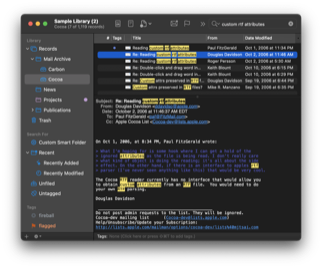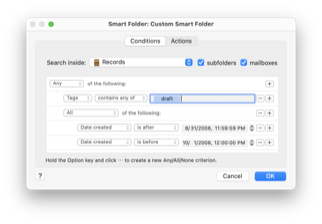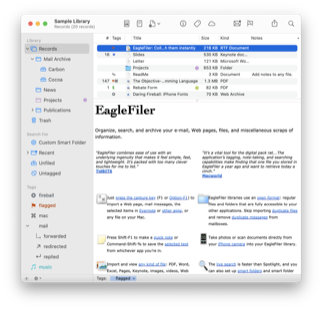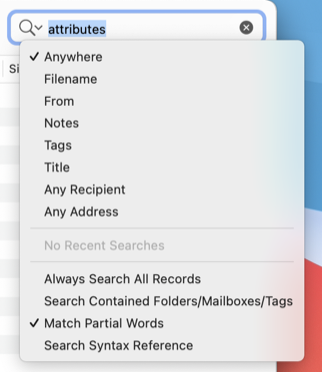EagleFiler 1.9.4
April 29th, 2021 (EagleFiler)Version 1.9.4 of EagleFiler is now available.
EagleFiler makes organizing and managing your information easy. It lets you archive and search mail, Web pages, PDF files, word processing documents, images, and more. Use it to collect information from a variety of sources. Browse different types of files using a familiar three-pane interface. Organize them into folders and annotate them with tags and notes, or leave everything in one folder and pin-point the information you need using the live search. Since EagleFiler stores its library in Finder format, you can use it in concert with the other tools in your Mac ecosystem.
EagleFiler is a digital filing cabinet, a research assistant, snippet collector, and document organizer. You can use it to write a journal, track all the files for a project or job, manage your bookmarks, save your favorite Web articles, store financial statements and receipts, run a paperless office, plan a trip, collect your course notes, archive your e-mail correspondence, search mailing list archives, research a purchase, remember recipes to cook or books to read, store scientific papers, sort photos, gather legal case notes, or assemble a scrapbook. It’s the most flexible tool on your Mac.
 This is a free update that includes the following enhancements:
This is a free update that includes the following enhancements:
- Improved the Import ENEX File… command, particularly to handle invalid XML generated by Evernote 10:
- If the ENEX file is invalid XML, instead of failing with an error, EagleFiler now tries to skip over the bad parts of the file to import as many notes as it can.
- The invalid sections of the file are saved as individual .enex files and imported into the Invalid Evernote Notes folder. EagleFiler also recovers what it can from each one and imports it as an RTF file.
- If the ENEX file is valid but the ENML for a particular note is invalid, instead of failing with an error, EagleFiler now tries to repair the XML. It saves the original XML in the Invalid Evernote Content folder, converts the ENML to RTF as best it can, and tags the RTF record with invalid_evernote_xml.
- If a note has an attachment with no file extension, EagleFiler now tries to infer one based on the file’s contents.
- Improved handling of images that cannot be resized.
- Fixed a bug where importing multiple notes having lone resources with the same name would only import one of them.
- Improved handling of libraries stored in iCloud Drive. We still recommend turning off Optimize Mac Storage in System Preferences ‣ Apple ID ‣ iCloud, as EagleFiler works best when the files in your library are fully downloaded to your Mac. However, it is now much better at handling files that have been evicted to save space:
- EagleFiler automatically downloads evicted files and notes when you view them or try to move or rename them. Mailbox files are downloaded if needed to rebuild the list of messages they contain.
- It does not download files in order to index them. This allows you to search files that had previously been indexed without downloading everything just to make sure the index is up-to-date.
- When you open a library and EagleFiler checks to make sure there are no missing files, it no longer reports evicted files as missing. However, if you do a manual Verify it will report errors for any files that are not fully stored on your Mac, as their content cannot be checked for damage.
 When opening a library, EagleFiler fully downloads essential files like smart folders and metadata backups, so that they are available to you and to prevent the creation of duplicates due to conflicts.
When opening a library, EagleFiler fully downloads essential files like smart folders and metadata backups, so that they are available to you and to prevent the creation of duplicates due to conflicts.- EagleFiler no longer reports an error when tagging an evicted file. Instead, it stores the tag locally in its database and applies it to the file the next time it’s downloaded.
- Improved importing of files stored in iCloud that were evicted from the Mac.
- Improved the Import Bookmarks… section of the manual.
 The source list can now display custom folder icons when running on macOS 11.
The source list can now display custom folder icons when running on macOS 11.- The source list contextual menu now lets you paste custom icons onto smart folders, not just regular folders.
- EagleFiler can now import a .eml file with an empty name, as FastMail sometimes exports.
- Added MJTWindowToolbarStyleUnified to the esoteric preferences. This lets you return to the pre–macOS 11 window style where the title is above the toolbar, leaving room for more toolbar items.
- If you try to move or rename a record whose file is missing, EagleFiler now warns you and aborts the operation to preserve the library’s integrity. (You can still move missing files to the trash to get rid of them.)
- If there’s an error moving a record, EagleFiler now reverts the change to prevent the database from getting out of sync.
- If WebKit crashes while downloading a Web page, EagleFiler now applies a workaround and retries.
- Fixed a bug where records that were in the process of being imported could displayed in the records list before the import was complete, thus temporarily showing the wrong file size or date.
- Fixed a bug indexing an RTFD file containing a PDF file with incomplete metadata.
- Fixed a bug where importing a file with a label could cause the label to turn into a color-named tag in EagleFiler or Finder could show an extra color-named tag.
- Fixed a bug where some toolbar buttons could have their borders clipped when running on macOS 11 with Increase contrast enabled.
- Fixed a bug where, on macOS 11, sometimes the source list text and icon would be drawn as if the window were in the background, when it wasn’t.
 Fixed a bug where an Anywhere search containing a lone - would never find any matches if Match Partial Words was checked.
Fixed a bug where an Anywhere search containing a lone - would never find any matches if Match Partial Words was checked.- Fixed a bug where invalid split view state could cause a window to open with a collapsed records list, which would confuse people because it would look like all the files were gone. (In fact, you could drag down the divider to show the records list.)
- Fixed a bug where a file that was in the process of being imported could be reported as missing if the library was being verified at the same time.
- Fixed a regression in EagleFiler 1.9.3 that could cause an error to be logged when emptying the trash if a record had a note, and could potentially leave forgotten records in the trash.
EagleFiler 1.9.4 works with macOS 10.12 through 11.3. Older EagleFiler versions are available for older versions of macOS. In-depth information about EagleFiler is available in the manual.
If you enjoy using EagleFiler, please take a moment to review it on the Mac App Store, Product Hunt, or MacUpdate or to mention it on Twitter, Facebook, or your own site. We’d really appreciate it.
Update (2021-04-29): EagleFiler 1.9.4 has been submitted to the Mac App Store and is awaiting approval from Apple.
Update (2021-04-29): EagleFiler 1.9.4 is now available from the Mac App Store.